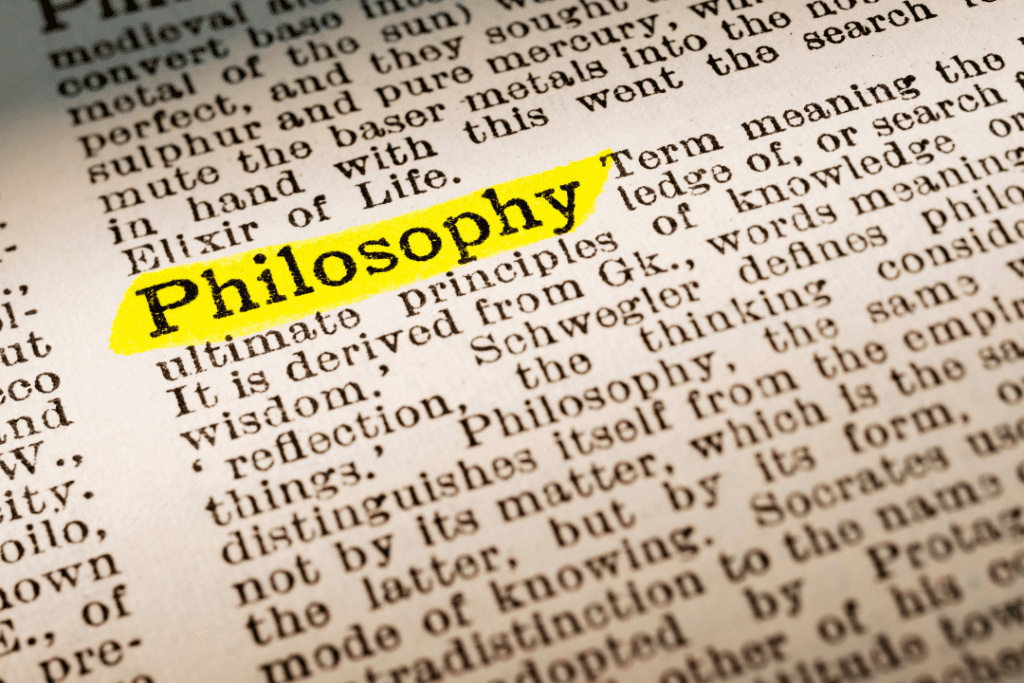Well if you have ever questioned if God exists, what the meaning of life is, whether beauty is ever truly subjective, whether there is right or wrong in actions, or whether laws and rules are ever fair or just, then you have contemplated philosophy and those are only a few philosophical subjects.
But what actually is philosophy? Where does it come from? Let’s dive a bit deeper into philosophy today:

Philosophy, as translated from the Greek, means ‘love of wisdom’, is the study of principles, examining the world and everything associated with it, including existence, reason, knowledge the mind, language, etc. The latter is defined as a rational and critical investigation that is capable of self-reflection in terms of its procedures as well as premises.
No matter how globalised and advanced the world is these days, philosophy rekindles the spirit of exploration and provokes critical discussion regarding various aspects of people’s lives. Thus, through philosophical thinking, life becomes more meaningful, people’s perception of reality is expanded, and humanity’s search for truth continues. Thus, philosophy can be seen not just as intellectual studies and contemplation but as a constant search for answers to the questions of the universe and the world’s enigmas, where reason helps to illuminate the darkness.

Major branches of philosophy:
Philosophy, as a discipline, underwent several changes throughout the years and subsequently developed into different branches further classified into traditions. Starting with Descartes and Kant up to Mill and Nietzsche, every period and philosopher added their own twist to what philosophical search entailed. Philosophical questions can be grouped into many branches. some of the major branches of philosophy are epistemology, ethics, logic, and metaphysics
Epistemology:
Epistemology is the study of knowledge within the branch of philosophy. Also referred to as theory of knowledge it seeks to provide insight on what knowledge is, how it is acquired, its boundsand its virtues. It also explores the concept of truth, belief, justification and rationality.
One area of epistemology asks how people acquire knowledge. Often-discussed sources of knowledge are perception, introspection, memory, inference, and testimony. Empirists contend that all knowledge is derived from experience in some way. Some of the questions addressed by epistemologists are “By what methods can one acquire knowledge?” or “How is truth established?”
Ethics:
Ethics or moral philosophy, is the branch of philosophy that deals with right actions. It is also concerned with the moral evaluation of character traits and institutions. It looks at what constitutes moral virtue and how one wishes to live. Philosophical ethics addresses such basic questions as “Are moral obligations relative?”, “Which has priority? and ‘’Why do people work? ‘’Larger questions are also posed, such as ‘’What is the purpose of existence?
Logic:
Logic refers to the domain responsible for providing the correct manner in which one arrives at a conclusion. Thus, it seeks to know what makes for a positive argument as well as a negative one. Some branches are sub-divided into formal and informal logic. Normally, formal logic employs artificial languages, which are formally defined symbolisms for arguments. Informal logic uses non-formal criteria and standards to assess the correctness of arguments. It relies on additional factors such as content and context.
Metaphysics:
Metaphysics is the branch of knowledge that deals with the general features of existence, objects, and their qualities. Metaphysicians attempt to answer basic questions, including “Why is there something rather than nothing?” “Of what does reality ultimately consist?” and “Are humans free?”
A key topic in metaphysics concerns the question of whether reality only consists of physical things like matter and energy. Alternative suggestions are that mental entities (such as souls and experiences) and abstract entities (such as numbers) exist apart from physical things. A very important area within the metaphysical category is the issue of identity. One question that has haunted philosophers for a long time is whether an entity can alter so much that it is no longer the same entity.
Different Philosophies:
When people talk about philosophy, they mostly talk about either Western philosophy or Indian philosophy. These are the two philosophies that have that early mover advantage, and they grew over time and shaped many aspects of culture and institutions. Discussions about these two traditions are often amplified by media, literature, and popular culture, which tend to highlight well-known philosophers and philosophical movements from these traditions, thus reinforcing their prominence.

Western philosophy:
Western philosophy originated in Ancient Greece in the 6th century BCE with the pre-Socratics. They tried to provide rational explanations of the cosmos as a whole. The first recognized philosopher was Thales of Miletus, who identified water as the ultimate reality.
Then the classical period of ancient Greek philosophy came, which centered on Socrates (469–399 BCE) and the two generations of students Plato (427–347 BCE) and Aristotle (384–322 BCE). Socrates focused on issues of human life such as happiness, justice, beauty, truth, and virtue. The peripatetic school is the final school of philosophy, which was founded by Plato’s student, Aristotle, during the classical period. Western philosophy has profoundly shaped modern societies by fostering critical thinking, democratic ideals, and scientific progress. Its emphasis on rational inquiry and debate encourages individuals to question assumptions and seek evidence-based solutions, which has led to advancements in technology, governance, and ethical standards.

Indian philosophy:
One of the most specific features of Indian philosophy is that it connects five branches of the investigation of reality and the means of knowing, as well as the spiritual quest for the identification of oneself. It started around 900 BCE, when the Vedas were written.
Here’s a complete guide to INDIAN PHILOSOPHY https://en.wikipedia.org/wiki/Indian_philosophy
Srutis are the initial texts of Hinduism and embody thoughts about the relation between the individual and the supreme and the nature of the soul’s reincarnations based on their deeds. This period also saw the emergence of non-Vedic teachings, like Buddhism (563–483 BCE) and Jainism (599–527 BCE). With the exception of the Sramanic traditions, the main schools of Indian philosophy were systematised and acknowledged primarily between 500 BCE and the terminal centuries of the CE.






0 Comments